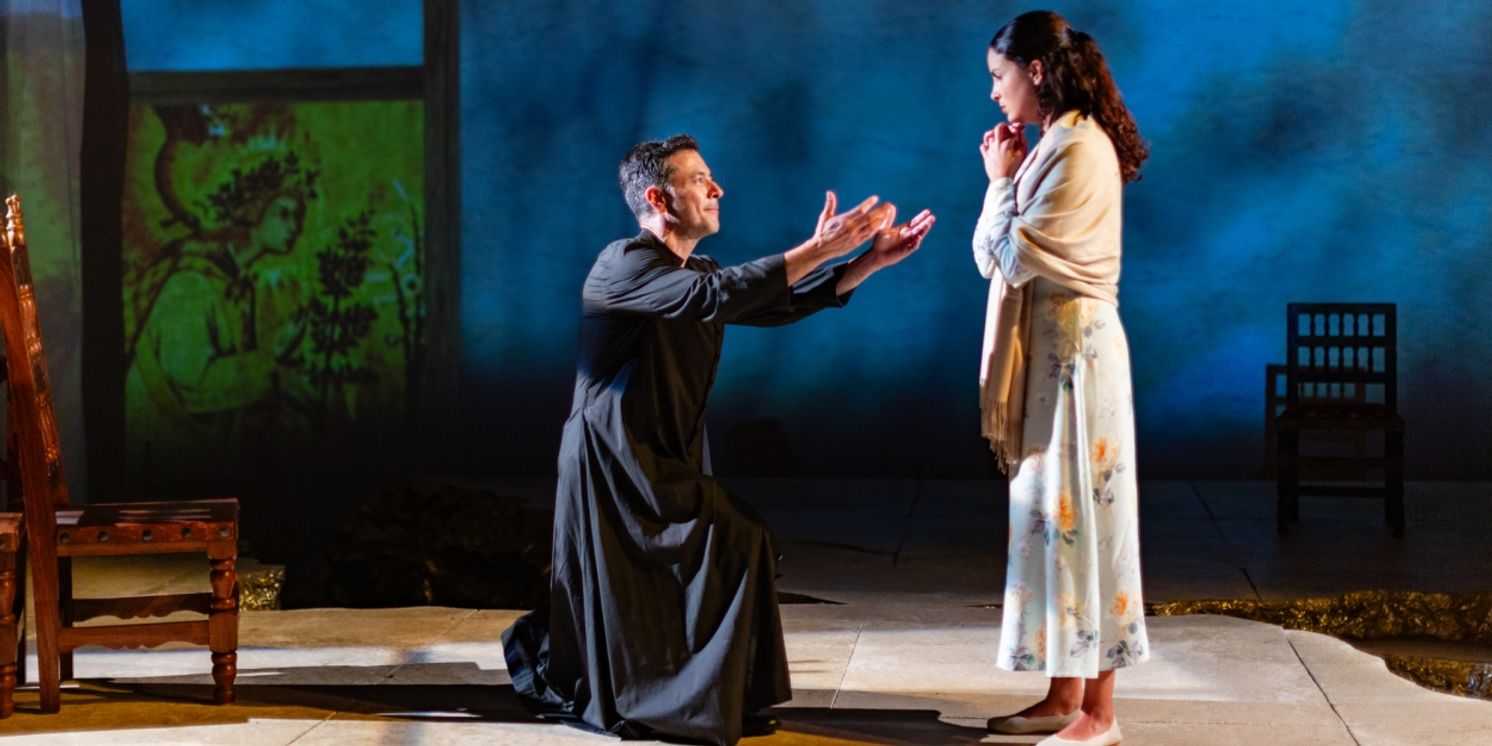Review: BAÑO DE LUNA (BATHING IN MOONLIGHT) at GALA Hispanic Theatre
A Priest Falls in Love in Spanish-Language DC Debut

The drama of a priest falling in love with a parishioner has been played out in many forms.
The tantalizing notion of a forbidden romance was part of Tennessee Williams’ “The Night of the Iguana,” Colleen McCullough’s novel “The Thorn Birds” (made into a TV miniseries with Richard Chamberlain), and the hot priest that tantalized Phoebe Waller-Bridge’s “Fleabag.”
It was also an apparent scandal in 2009 when a Cuban-American priest in Miami, famous as a broadcast host, was forced to leave the Catholic Church after photographs emerged of him kissing a woman at a public beach, presumably in the moonlight.
It was enough of a scandal to inspire a new play by Pulitzer Prize winning playwright Nilo Cruz. “Baño de Luna” (“Bathing in the Moonlight”) is receiving its Spanish-language D.C. premiere at the GALA Hispanic Theatre in a strong production.
Leave it to the Cuban-born Cruz, who won the Pulitzer 20 years ago for “Anna in the Tropics,” to bring poetry and theologic consideration to the issue, which to non-Catholics may not be an issue at all.
In fact, it’s rather benign romance that blossoms between Raúl Méndez’s Padre Monroe and Hannia Guillén’s single mother. But if you don’t think they’re on shaky ground, Clifton Chadick’s set design spells it out for you: an enormous chasm zig-zagging across the raised marble-like platform. Its edges shine as if to constantly remind you of its dangers. For theatergoers, it’s almost a distraction worrying that an actor will errantly back into the hole and get injured.
The danger is enhanced by the lighting of Christian D. Henrriquez, the church and home settings are distinguished by the projections of Hailey Laroe. Sidney Forkpah designed costumes, sacred and profane.
If there’s a whiff of shock in the proceedings, it comes early, when Padre Monroe comes on a little strong to the young parishioner, whose faith tells her that this kind of connection is verboten.
Yet it’s paced such that their relationship isn’t sealed until the end of the first act, and even then with a kiss that generates a gasp in the audience (proving that, yes, this actually still is a forbidden notion to many).
More than a two-hander, though, Cruz’ work is built on creating a Cuban-American home, whose elderly matriarch (Luz Nicolás) is beginning to fail despite a strong spirit; a prodigal son who returns home after failing in medical school; and a graduating grandson eager to get into the world.
The acting throughout is strong. Méndez, a Mexican film actor (who has appeared in the streaming series “Narcos” and “Sense 8”) is dashing and compelling as Padre Monroe, able to hold the audience from his opening homily, about the necessity to widen the boundaries of the church, not narrow them.
It’s no surprise that women of many generations are drawn to him.
The object of his heart, though, is Marcela, a glowing presence played by Guillén another experienced actor who is also making her GALA debut (she was in the soap “Passions” and “Burn Notice,” as well as a number of previous plays by Cruz. Her allure to the priest is said to have come through her passion in playing piano (she had to sell her own to finance the failed medical hopes of her brother). One drawback is that we don’t get to see this talent or its enchantment unfold.
Nicolás, a GALA favorite, shines again as the grandmother, who is hilarious one moment and touching the next. She mistakenly thinks her long gone returning son is actually her late husband. Accordingly, Hiram Delgado, a Puerto Rican actor with his own impressive list of credits (“Madam Secretary,” “New Amsterdam”) plays both.
Victor Salinas gives some energy to portraying Marcela’s son, and as a member of the younger generation, nonplussed about his mother’s new apparent love.
It is up to Obispo Andrews, a GALA company member, to give weight and consideration as bishop to the decision on his apparently straying priest.
The nature of love and its often less-emphasized role in the Bible become part of Padre Monroe’s pleadings and offers food for thought in a production that doesn’t always rely on words. Indeed, there’s no choreographer credited, so we may Cruz, who also directed, was behind the movement on stage that includes what we interpret as a bare-chested plea for understanding in act two.
There’s also a near-surrealistic scene that precedes the grandmother’s demise, in which she imagines being reunited with her husband.
The underlying struggles of a Cuban family adjusting in America helps bring some heft to “Baño de Luna,” whose central quandary about love vs. devotion would seem to have been settled long ago.
Running time: About two hours with one intermission.
Photo credit: Raul Méndez and Hannia Gullién in “Baño de Luna (Bathing in Moonlight).” Photo by Daniel Martinez.
“Baño de Luna (Bathing in Moonlight),” in Spanish with English subtitles, continues through Oct. 1 at GALA Hispanic Theatre, 3333 14th St NW. Tickets at 202-234-7174 or online.
Reader Reviews
Videos

